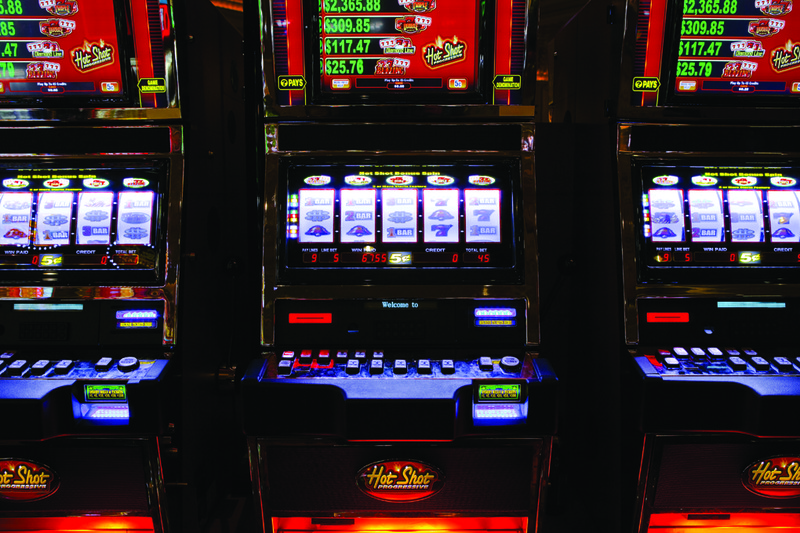Slot machines back in business
The General Assembly has passed a temporary measure to allow Delaware fraternal organizations to operate video lottery machines.
House Bill 1 was approved by 34 of the state’s 41 representatives, Jan. 23. Senators passed the bill in a vote of 17-1, Jan. 24. Seven legislators did not vote on the bill.
HB 1 awaits Gov. Jack Markell's signature before it can be enacted.
The bill allows fraternal groups, such as American Legion, Elks, Moose and Veterans of Foreign Wars, to operate up to 20 video lottery machines per site. The bill would sunset on Sunday, June 30. State officials say they hope to have a permanent solution in place by then.
“This isn’t a perfect solution, but it’s a step in the right direction to get these service organizations back on their feet financially and helping the people who need it most through the groups’ charity,” said Rep. John Atkins, D-Millsboro, who is sponsoring the bill.
House Speaker Pete Schwartzkopf, D-Rehoboth Beach, said it was critical to get something in place before the General Assembly takes its six-week break for budget hearings.
Thursday, Jan. 24, is the last day of session before Joint Finance Committee hearings begin. The General Assembly does not reconvene until Tuesday, March 12.
“This is a stopgap measure that gives us a little more breathing room to work on a more permanent solution rather than rushing to get something done,” Schwartzkopf said.
For more than a decade, organizations had used profits from slot machines as a main source of funding for operations and charitable donations.
Veterans’ organizations across the state were notified that operating slot machines is a violation of state gambling laws, and if caught, the organizations face revocation of their liquor licenses. Delaware Alcohol and Tobacco Enforcement Director John Yeoman and Delaware State Police Col. Robert Coupe signed the letter, dated Oct. 22. But fraternal leaders say they did not receive the letter until after the Nov. 6 election.
The organizations are battling to legalize the machines, and many members say the letter was sent as the result of pressure from Delaware’s three casinos.
Fraternal organizations with a national affiliation or whose membership consists of veterans honorably discharged or active service members would be protected under the proposal.
Rep. Helene Keeley, D-Wilmington South, was the only representative to vote against the bill; Sen. David Sokola, D-Newark was the only senator to vote against it.
Keeley said the bill only assists groups outside of Wilmington. “We do not have an Elks, we do not have a VFW, we do not have a Moose,” she said.
Keeley said smaller organizations, such as Polish Library Association and the Piedmont Club, operate in the city and do charitable work, but the bill does not protect them because they are not part of national organizations. “I think it’s extremely unfair,” she said.
Department of Finance Secretary Tom Cook, who testified during the House session, said the organizations Keeley mentioned had not contacted the Department of Finance.
Rep. Mike Ramone, R-Middle Run Valley, did not vote on the bill. He said many families of members of fraternal organizations were victims of the member’s gambling problem. “There’s a lot of vets whose families are a lot worse off because this environment was present,” he said.
Senate Minority Leader Gary Simpson, R-Milford, did not vote on the bill because, he said, the public should have been given a chance to weigh in. “While I understand the rationale for rushing this bill through, I think this is one case where we should not have done that,” he said.
Sen. Karen Peterson, D-Stanton, also did not vote on the bill. “These groups were engaged in illegal activity,” she said. “Now, we have to break all of our rules and rush this through.”
Peterson also questioned the organizations’ charitable donations. “We have not seen one list of how much has been given and to whom it’s been given,” she said.
Sen. Bob Venables, D-Laurel, who voted for the bill, said two of his grandchildren received $2,500 college scholarships from the American Legion. “They do a lot of good in the community,” he said. “We need the temporary relief.”
Cook said the bill is only a temporary solution, and he expects a bill to permanently address the issue will come up for debate when legislators reconvene in March.
According to the bill, slot machines must award players 50 percent to 70 percent of each dollar played. After the payout, organizations would be required to pay 43.5 percent of the proceeds to the state – the same amount Delaware’s three casinos pay.
All slot machine locations and machine vendors must be approved by the state lottery director, and the organizations will have to provide a monthly report of all revenue from the machines to the State Lottery Office.
Delaware AMVETS member Tom Jones, who participated in discussions with the state, sent a Jan. 22 letter to House representatives asking them to support the measure.
“The Department of Delaware AMVETS, as part of Nonprofit Coalition of Delaware, has worked with legislators and the Governor’s administration over the last two months to try and resolve the charitable gaming machine issue,” Jones wrote.
Jones said several fraternal organizations in the state would not survive unless a permanent solution is signed into law.
“An interim solution will have a great impact, and we greatly appreciate any and all support you can give to this legislative proposal,” Jones wrote. “While not ideal, we trust that you will support us in the enactment of this critical legislation.”





















































